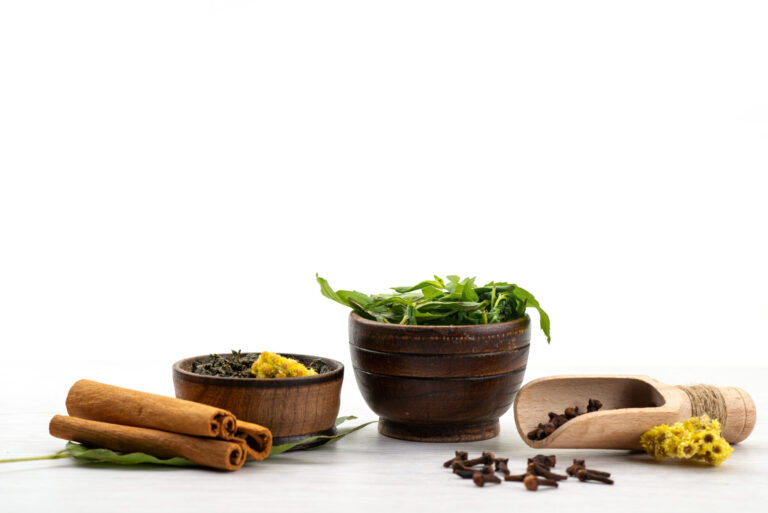
In modern wellness, adaptogens offer us an amazing way to achieve natural healing and balance, taking a leaf from the wisdom of ancient herbal practices. These natural substances have seen a resurgence, capturing the attention of health enthusiasts worldwide. But what sparks this growing fascination with adaptogens?
Adaptogens are unique in their ability to help the body resist various stressors, including physical, chemical, or biological challenges. They work to harmonise the body’s stress-response system. This remarkable property is not just a recent discovery; for centuries, cultures around the world have harnessed the power of adaptogens for healing and well-being.
Nature’s Gift: How Adaptogens Bolster Health
Adaptogens, deeply rooted in traditions from Ayurvedic and Chinese medicine, are like nature’s own stress-relievers, packed with a variety of health benefits. Besides their well-known ability to reduce stress, these herbs are champions in supporting the immune system, which is crucial in our battle against common illnesses and infections. They also play a significant role in maintaining hormonal balance, impacting everything from our metabolism to our mood.
What’s fascinating about adaptogens is their ability to enhance both physical and mental stamina. This makes them a valuable ally in dealing with fatigue and improving focus and cognitive function. For example, Rhodiola is celebrated for enhancing mental performance, especially under conditions of stress or fatigue. Holy basil, or Tulsi, another adaptogen, holds a special place in Ayurvedic tradition for its restorative properties and is used for everything from reducing blood sugar levels to easing joint pain.
The scientific community is also becoming increasingly interested in these herbs, with research backing up many of the benefits attributed to them. A recent study about “Evolution of the adaptogenic concept from traditional use to medical systems” found there to be many potential benefits of adaptogens. Studies like this have revealed that adaptogens have significant effects on the neuroendocrine-immune system, supporting their use in managing stress-induced conditions and ageing-related disorders. The research also highlights adaptogens’ roles in neuroprotection, immune modulation, and stress response, underscoring their value in enhancing mental and physical performance.
Incorporating Adaptogens into Everyday Life
Bringing adaptogens into your daily routine can be both simple and enjoyable. These herbs are available in various forms, making them easy to incorporate into your diet. You can start your day with a smoothie sprinkled with ashwagandha powder or unwind in the evening with a cup of Rhodiola tea. These small additions to your daily routine can make a big difference in your overall well-being.
However, it’s important to approach adaptogens with caution. Not all adaptogens are suitable for everyone, and some can interact with medications. It’s essential to consult a healthcare professional before beginning any new supplement, especially if you have existing health conditions or are on medication. For a start, here’s a list of the best sources for incorporating adaptogens into your life:
- Ashwagandha Powder – Ideal for adding to smoothies, oatmeal, or even baking recipes.
- Rhodiola Tea – Perfect for a soothing, stress-relieving beverage in the evening.
- Holy Basil (Tulsi) Leaves – These can be brewed into tea or added to dishes for a herbaceous flavour.
- Ginseng Capsules – A convenient way to incorporate this adaptogen if you’re always on the go.
- Maca Root Powder – Great for blending into smoothies, yoghurt, or homemade energy bars.
- Schisandra Berries – They can be brewed into tea or taken as a supplement.
- Cordyceps Extract – Available in tincture or powder form, suitable for adding to drinks or meals.
- Eleuthero (Siberian Ginseng) Root – Often found in tea or capsule form.
- Licorice Root – Can be used to make tea or chewed as a natural treat.
- Reishi Mushroom Powder – Ideal for mixing into hot beverages like coffee or hot chocolate.
The Intersection With Mental Health
Adaptogens have a special role in mental health care, offering us a natural approach to managing stress, anxiety, and mood fluctuations. These herbs work by helping the body to adapt to stress and exerting a normalising effect upon bodily processes. For instance, ashwagandha is known for its ability to lower cortisol levels, the body’s stress hormone. This can lead to improvements in stress and anxiety levels. Similarly, Rhodiola rosea is often used for its fatigue-reducing and brain function-enhancing properties. This makes adaptogens a valuable tool for those who prefer natural methods over traditional pharmaceutical approaches to mental health.
Research has also shown that adaptogens can have a positive impact on mental well-being. They work by modulating the production and release of stress hormones from the adrenal glands. Clinical trials, particularly on adaptogens like Rhodiola rosea and Schisandra chinensis, have shown their effectiveness in improving mental performance and endurance, particularly in conditions of fatigue and weakness. These regulatory effects on stress hormones show the potential of adaptogens as a valuable component in mental health, offering us remarkable benefits without the side effects often associated with conventional medications.
Personalising Usage for Maximum Benefit
Personalising the use of adaptogens requires a thoughtful approach. Here are some tips to tailor adaptogen use for the best benefits:
- Identify Your Needs: Start by pinpointing what you want to address. Is it stress, fatigue, lack of focus, or sleep issues? Different adaptogens work better for different issues. For example, ashwagandha is great for stress and anxiety, while Siberian ginseng can benefit physical endurance and energy.
- Consult a Healthcare Professional: Before starting any new supplement, especially adaptogens, it’s important to talk to a healthcare provider. This is especially crucial if you have existing health conditions or are taking other medications.
- Start Slowly: When introducing a new adaptogen, start with a low dose and gradually increase it. This allows you to see how your body reacts and adjust accordingly.
- Monitor Your Body’s Response: Pay attention to how your body responds after taking adaptogens. Look for changes in energy levels, sleep patterns, stress levels, and overall well-being.
- Combine with a Healthy Lifestyle: Adaptogens work best when combined with a healthy lifestyle. Eating a balanced diet, getting regular exercise, and ensuring adequate sleep all enhance the effects of adaptogens.
- Consider Synergistic Effects: Some adaptogens work well when combined. For example, ashwagandha and holy basil together can enhance stress relief. However, it’s important to research or consult a professional before mixing adaptogens.
- Adjust as Needed: Be prepared to adjust your adaptogen use based on your body’s changing needs. What works for you at one point might need to be modified as your health and lifestyle change.
- Quality Matters: Choose high-quality, reputable brands for adaptogens. This ensures that you’re getting a pure and potent product.
By personalising adaptogen usage and integrating it into a holistic health plan, you can maximise its benefits and achieve better harmony in your physical and mental well-being.
A Holistic Approach to Health with Adaptogens
In conclusion, adaptogens offer us a fascinating and natural pathway to enhanced wellness. As you dive into the world of adaptogens, it’s important to view this journey as part of a balanced lifestyle, which includes a nutritious diet, regular physical activity, and mindfulness practices.
The ancient wisdom of adaptogens, seamlessly integrated with contemporary lifestyle choices, opens the door to a healthier, more harmonious life. Embracing adaptogens is not just about adding a supplement to your diet; it’s about adopting a holistic approach to health that honours both ancient traditions and modern understanding.


